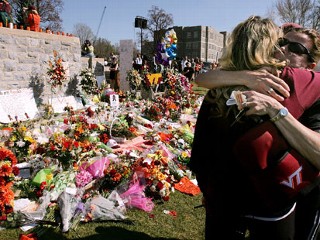
Thanks to the blog “We Must Not Think Too Much,” I found the following Baltimore Examiner article by Karl B. Hill about the Johns Hopkins Mood Disorder Symposium that I attended last Tuesday.
Again, how thrilling it was for me to me at an event where so many prestigious names and prominent people could come together to teach and inform and tell stories.
Writes Hill:
With a little help from Baltimore’s Dorothy Hamill and actress Mariette Hartley, Johns Hopkins School of Medicine is trying to shed more light on mood disorders and bring them out of the closet.
Hamill and Hartley offered frank, often dramatic testimonies of their battles with depression, alcoholism and bipolar disorder during the 22nd Annual Mood Disorder Symposium on Tuesday.
After her Olympic win in 1976, Hamill said, she stopped training in the morning and stayed up late, wined and dined companies and made late-night television appearances.
“I was just kind of going through the motions,” she said. “I had no motivation. I didn’t want to get on the ice again. I ate a lot,” she said, recalling the beginning of her first major bout with depression. “I’ve since realized that severe depression runs in both sides of my family.”
Hamill and Hartley also said while growing up, they missed some of the warning signs of both their own illnesses and their parents’ troubles.
“I remember picking my mother up in the forsythia bushes … and bringing her into the house. I didn’t know that was not normal,” Hartley said. “I knew one family that didn’t drink, and they were terribly boring.”
Hartley’s grandfather John B. Watson was a Hopkins graduate and leading behavioral psychologist.
He raised a family of troubled children, including Hartley’s mother, whom Hartley described as “emotionally impoverished.”
Suicide was a common thread in her family.
“My father shot himself in the head in the room next to where my mother and I were eating breakfast,” Hartley said. “I was 23. I was on the verge of a major career, and my brain seized. Oh, I did a lot of work. I was in a lot of Westerns, which, of course, had a lot of gunfire, and I was lying on the ground in a fetal position. I didn’t know what was happening.”
Medicine provided many of the answers, including Hartley’s post-traumatic stress disorder diagnosis.
But major disorders such as bipolar disorder and depression remain a mystery in the very young, said Dr. John Walkup of Hopkins.
“Repeatedly we hear adults describe the early onset of bipolar disorder by talking about what they remember from when they were kids,” he said.
Science is just beginning to recognize some of these illnesses and how to effectively treat them.
Having famous personalities speak frankly about these issues helps strip the stigma from mood disorders, said Dr. Ray DePaulo, of Hopkins. “It also destigmatizes these illnesses as you learn more about their origins.”

